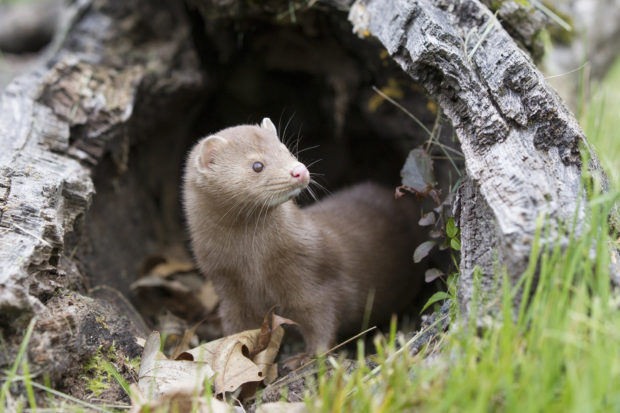
The Swedish National Veterinary Institute says that wild mink infected with the virus do not pose an additional risk to humans beyond the ongoing, pervasive threat of person-to-person infection. Photo by Dreamstime
A mink living in the wild near an infected Utah fur farm has tested positive for the coronavirus, providing yet another pressing reason why the United States needs to end all mink fur farming without further delay.
While it is not clear if the infected animal had any contact with the mink on the fur farm, investigators found the exact virus sequence as that observed in infected mink on the farm. This is the first report of a wild mink testing positive for the virus anywhere in the world, and it signals the disturbing likelihood that intensive confinement farms where minks suffer and die for their pelts are now the source of potential harm to mink in the wild.
The U.S. Department of Agriculture’s National Veterinary Services Laboratories says that there is currently no evidence that the virus is circulating or has been established in wild populations surrounding the infected mink farms. Several animals from different wildlife species were also sampled, but they all tested negative.
Mink in the wild are solitary animals and are not likely to spread the virus to each other, according to veterinary experts. The Swedish National Veterinary Institute says that wild mink and escaped mink from fur farms infected with the virus do not pose an additional risk to humans beyond the ongoing, pervasive threat of person-to-person infection.
But this does not absolve U.S. authorities from quick action to ensure there is no further spread of the virus among mink, both on fur farms and in the wild. And the best—and only—way to do that would be to stop fur farming in its tracks.
We have been making the case since the beginning of the pandemic for ending cruel confinement practices like fur farming because animals held in cramped, crowded spaces are far more likely to contract and spread dangerous diseases that can jump to humans. As the pandemic has progressed, we have seen these fears turn to reality.
So far, around the world, 11 countries have reported positive mink on fur farms, as have four U.S. states—Wisconsin, Oregon, Utah and Michigan. In the Netherlands and Denmark, cases of the virus jumping from mink to humans have been reported.
While there is no good ending for a mink on a fur farm, the pandemic has magnified the cruelty and suffering for the animals. In an effort to control the spread of the virus, tens of millions of mink have been slaughtered on fur farms globally, usually by gassing. Mink are semi-aquatic and can hold their breath for extended periods of time, which means that they can suffer significantly during gassing.
The crisis has prompted the Netherlands to move up its deadline for ending all mink fur production from 2024 to the end of this year, and France has also announced a ban on mink fur production. Humane Society International is now pressuring Denmark and other countries, where mink have tested positive, to close down their fur farms. Recently the world’s largest fur auction house, based in Denmark, announced it will close next year.
We need similar action from the federal government here in the United States because states with infected mink fur farms have been doing very little to address the problem. As we have reported, the inaction has continued despite news that a mutation of the coronavirus has been found on mink fur farms in Utah—a mutation some fear could interfere with progress on a vaccine. With the pandemic bringing nothing but bad news from fur farms—and with the fur industry already in sharp decline around the world due to disappearing consumer demand—there is not one good reason to keep the business of fur alive, at such great cost to public health and animal welfare.
Sara Amundson is president of the Humane Society Legislative Fund.
The post Mink living in the wild near Utah fur farm tests positive for coronavirus, increasing urgency to end fur farming appeared first on A Humane World.
Enviroshop is maintained by dedicated NetSys Interactive Inc. owners & employees who generously contribute their time to maintenance & editing, web design, custom programming, & website hosting for Enviroshop.
